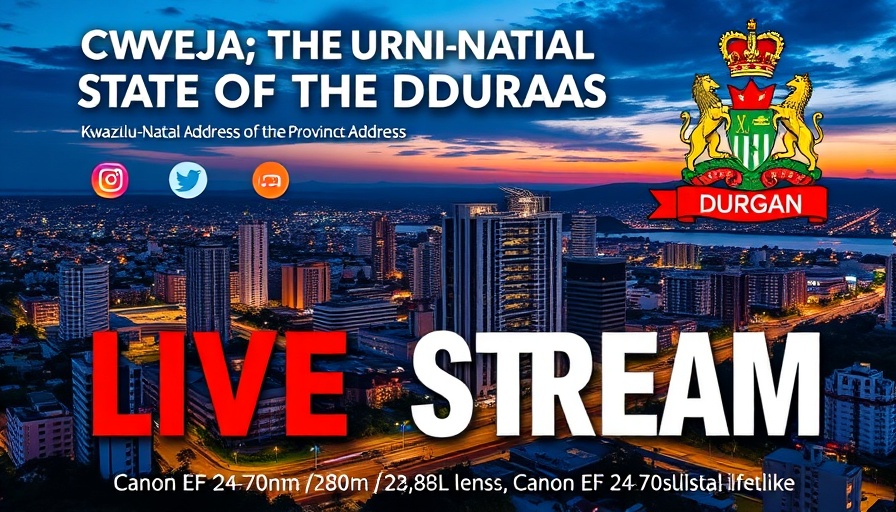
Premier Thami Ntuli's Promises: A Balancing Act
As the clock ticked closer to the beginning of KwaZulu-Natal's State of the Province Address (SOPA), anticipation filled the air at Woodburn Stadium in Pietermaritzburg. Premier Thami Ntuli took to the stage to confront the daunting issues plaguing the province. With less than a year in office, Ntuli acknowledged the multitude of governance challenges that include rising crime rates, economic hardship, and disaster management due to extreme weather events.
The Iron Grip of Crime and Corruption
Current events have highlighted the escalating crime wave in KwaZulu-Natal, a challenge that has been the bane of the province for years. Reports of violent crime have raised concerns over police inefficacy and public safety. Further complicating matters is the pervasive issue of corruption, which has eroded public trust in governmental institutions. Addressing these issues head-on, Ntuli underscored the need for improved policing and judicial independence as critical tenets for restoring faith in the state's institutions.
A Focus on Socio-Economic Development
Central to his address were critical socio-economic issues including unemployment, which stood at staggering levels, particularly among the youth. Ntuli's commitment to addressing youth unemployment holds substantial weight as South Africa prepares for the upcoming 2024 general elections. The promising initiatives aimed at tackling poverty and improving service delivery were credited as vital components of the province's development strategy. The public will be watching closely to see whether these promises materialize into tangible outcomes.
Climatic Challenges and Infrastructure Resilience
Natural disasters, notably flooding, have become increasingly frequent in past years, exacerbating infrastructure woes and displacing vulnerable communities. In his address, Ntuli emphasized a multi-faceted approach toward disaster management, enhancing the province's readiness for climate-related emergencies. He criticized the lack of robust infrastructure that leaves communities vulnerable and reaffirmed the government's commitment to investing in resilient infrastructural development as part of a larger economic policy.
The Road to Electoral Integrity and Governance Transparency
As elections loom, the discussion around electoral reform and anti-corruption measures becomes paramount. With a coalition government formed of multiple parties, including the African National Congress (ANC), the Democratic Alliance (DA), and others, the balancing act of representation poses both a challenge and an opportunity for improved governance. Ntuli's address pointed towards initiatives aiming for a fair electoral process that will not only raise voter turnout but also restore public confidence in democracy.
A Vision for the Future
Looking towards the future, Ntuli laid out ambitious plans that promote real change. Emphasizing land reform, economic freedom, and the transformation of the public sector are markers of his governance strategy. Ensuring accessibility to education and public health, particularly initiatives like the National Health Insurance (NHI), signify a commitment to addressing systemic inequalities that plague the region.
Moreover, Ntuli's articulation of a shared vision for KwaZulu-Natal invites grassroots engagements and civil society participation as essential cogs in the machinery of change. By putting forth actionable insights, he encourages community involvement in policymaking to enhance democratic participation.
Engaging the Province's Citizens
Ultimately, the success of NTuli's government will hinge not just on promises articulated in grandiloquent addresses but on executing and following through with actionable insights. Building strong public sector reforms and enhancing service delivery will be vital to winning the trust of KwaZulu-Natal's residents. Premier Ntuli’s message rings clear: political alignment must shift from rhetoric to action involving various stakeholders, focusing on collaborative growth.
As we digest the implications of Ntuli's SOPA, engagement from all citizens becomes paramount. Active participation in civil society and holding leaders accountable is essential in creating a responsive and responsible government. Therefore, let us not only remain observers but also become participants in our democracy, actively influencing the direction that KwaZulu-Natal takes during this pivotal period.
The upcoming years are poised to challenge every aspect of governance in KwaZulu-Natal. It's time for the people to step into the fray and demand the improvement they rightfully deserve, forging a path toward a more equitable future.
 Add Row
Add Row  Add
Add 




Write A Comment